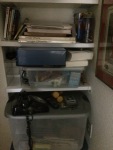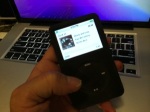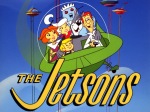Lot’s of history is “preserved” that way. I’m testament to that and sorting through boxes of papers and artifacts from my previous lives. I don’t know why I’ve held on to this stuff for so long.
Don’t be surprised if you get a mysterious envelope filled with some tangible tie between us.
Literal shared memories.
The main reason I like making historic documentaries is the research. I’ve gotten to know my way around the state of Wyoming archives, on three projects, most recently one about modern expressionism in Wyoming.
I like handling old photographs and learning about things past and assembling it all into a story.
A few years ago when iPods came out, I early-adopted one of the huge 80 gigabyte models.Back in the days of cassettes, the rage was compiling a variety of music mixes on tape from LP vinyl records.
We used to borrow each others albums and copy them for our own collections. Not only had I accumulated vinyl, cassette tape music mixes, but also started buying CDs.
The iPod was supposed to revolutionize music storage. That it did, but they also sterilized memory making.
Hard copy.
A friend of mine posted on facebook recently about some problem he was having with his iPod hard drive – we have the same model – about cracking the case to get at it and the battery.
Backing up information continues to be a headache, not to mention batteries going dead. There’s a company that makes an adapter to replace the hard drives with high capacity SD cards, which is a pretty good idea. I’m looking into bumping mine up to 256GB.
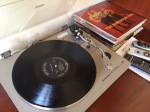
My turntable still plays records, but I got rid of all of them in favor of CDs. My neighbor still has some discs to spin.
Kids must be learning different things in school. Metaphors must be changing, too, with way fewer industrial references.
I don’t think talkative people sound like broken records, or those with disagreements are now on the same wave length.
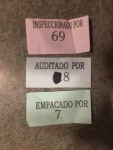
Carhartt jeans are still inspected by people, including these three in a factory in Mexico. They add that personal touch.
We’re led to believe that everything is automated and made by high tech machines.
There are still some items that have the human touch, including my Carhartts made in Mexico.
Not only were my trousers inspected three times, but one of the inspectors saved on paper by changing their ID number using a Magic Marker.
I don’t know what I expected the future to be like by now. When I was a kid there was the Hanna Barbera cartoon sit-com “The Jetsons.”
The Jetsons traveled around in hover craft, their house was cleaned by a robot named Rosie. George worked at the Spacely Sprockets office, Jane puttered around the house, Judy was in high school and Elroy was in elementary school.Middle class and All-American for the future as envisioned in the early 1960s, which was the same present portrayed in Leave it to Beaver.
For 99 percent of us, we did become mass society – most everyone has a TV, microwave oven, internal combustion engine car.
Carhartt is one of those companies that has purged it’s guilt with a “Made in the USA” line and also stuff made elsewhere. Regardless, it’s good to know there are humans involved in the manufacturing quality control.
There’s plenty of esoteria that goes into making smart refrigerators and smart coffee pots, but the basic purposes remain the same – keep food cold and water hot.

After the Star Ship Enterprise blew up, Picard was able to retrieve his family album as he took over the Star Fleet command.
Some of the photos and papers dated back to the 18th century. If it was digitized, the electromagnetic pulse would have wiped the disc clean.
Hard copy isn’t safe from disaster. The library at Alexandria was the book repository for the world at that time and it was supposedly destroyed by a big fire – no copies left of any of that.

Grocery store plastic bags cost a dime in Boulder, Colorado. The hope is to reduce the amount of trash that will be preserved for future generations to find and learn about our culture.
My neighbors use those nuclear war-proof bags with the draw strings. Archaeologists and paleontologists of the future will have a pretty good idea about our 21st century culture and determine that we inhabitants revered our detritus as evidenced by the stockpiles of leftover food, old papers and various containers hidden in large altars excavated into hill sides surrounding urban areas.

